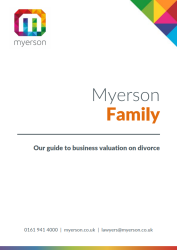Dividing Business Assets On Divorce
When the Court looks at the value of a shareholding in a business in the context of family law proceedings, it looks to ascertain a valuation that a willing buyer would pay to a willing seller for that shareholding.
The Court is, therefore, looking at the true market value when considering business valuations on divorce.
If a shareholding is in a company listed on the stock exchange, it is more straightforward because each shareholding has a transparent market value.
Valuing a Business during a Divorce
Future Maintainable Earnings Method
When a private trading company is to be valued, the main business valuation method used is the "Future Maintainable Earnings Method".
In simple terms, this methodology looks at how much profit the business can be expected to make each year. It is reasonable to assume that a buyer is prepared to pay a multiple of these profits, as the buyer will expect to get at least those profits back each year.
Net Asset Method
Another valuation method is the "Net Asset Method". This method values a company by referencing the realisable values of its net assets minus liabilities.
This valuation method is usually applied to an investment company, where the company's valuation is directly linked to the value of the investments.
It can also be used for companies with low profitability, where there is limited or no value to the future profits and limited growth expectations.
Business Valuation Evidence
It is usually necessary to have the benefit of business valuation evidence within financial remedy proceedings.
An application to rely on business valuation evidence must be made before the first hearing, known as the First Directions Appointment (FDA).
The parties should agree on the instruction of a Single Joint Expert (SJE).
Before placing any business valuation evidence before the Court, that party must seek permission from the Court to obtain a valuation. The Court must consider whether the valuation evidence is necessary before granting permission.
Below are examples of questions that may be put to a valuation expert:
- What is the value of the shareholding?
- Are there any minority shareholder discounts to take into account?
- What are the tax consequences of any disposal or transfer of the shareholding or any cash extraction, if applicable?
- What is the capital liquidity available to the shareholders?
- What is the likely future gross and net sustainable income available for
- The shareholders now and in the future?
Challenges to Business Valuation Evidence
If one party is dissatisfied with the valuation evidence, the starting point is to raise questions with the expert. If those questions do not resolve the issue, there is the option to cross-examine the expert at the final hearing or apply to rely on another expert.
Liquidity
The liquidity of a business is very important and is often a source of conflict between parties.
In some cases, no or limited capital funds can be extracted from the business without damaging its performance. The ability to continue trading to provide an income for one or both parties is fundamentally important.
How does the Court treat business assets?
The Family Court recognises that there is a difference between risk-laden assets (like business assets) and copper-bottomed assets, such as property and cash.
It is unlikely that the Court would make an order that would result in one party retaining all the risk-laden assets (the business), leaving the other party to retain all the copper-bottomed assets (cash and property).
Usually, it would be more appropriate to spread the risk between the parties.
The Court has wide discretion when deciding how businesses should be treated in divorce:
- A transfer of shares from one spouse to the other, subject to a lump sum payment;
- A transfer of shares from one spouse to the other, subject to the payment of spousal maintenance payments;
- A transfer of shares from one party to the other without any further payment upon the basis that the other spouse has more of the non-business assets. However, this would result in the spouse who retains the business retaining more of the risk-laden assets, and therefore, this may produce an unfair result;
- Each spouse retaining their interest in the business, subject to a shareholders' Agreement to clarify how the business is to be run in the future;
- An order for the sale of the business.
How Our Family Law Team Can Help With Dividing Business Assets on Divorce
- Accurate Business Valuation: We have close links with forensic accountants who can value a business using the right method for the type of business. us
- Expert Guidance: We address issues like minority shareholder discounts and tax consequences of share transfers or disposals.
- Dispute Resolution: We assist with questioning or cross-examining valuation experts and can recommend additional experts if needed.
- Liquidity & Risk Management: We help manage business liquidity and a fair division of risk-laden assets.
- Tailored Solutions: We facilitate share transfers, negotiate lump sum payments, and assist with shareholder agreements for fair business division.
- Full-Service Law Firm: As a full-service law firm, we provide access to expert corporate and commercial law advice, ensuring that all aspects of your case are handled seamlessly.
Testimonials
Meet Our Family Solicitors
Home-grown or recruited from national, regional or City firms. Our family lawyers are experts in their fields and respected by their peers.
Contact Our Experts
You can contact our lawyers below if you have any more questions or want more information:











